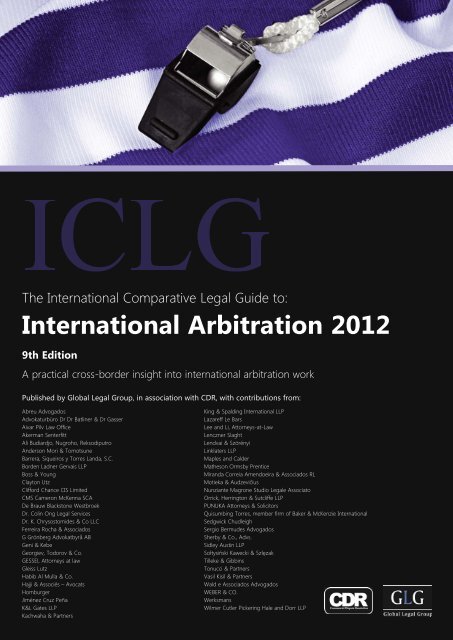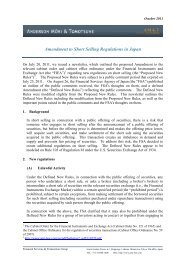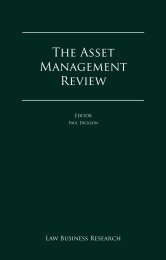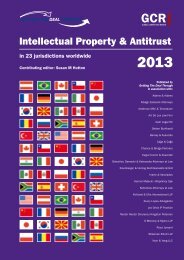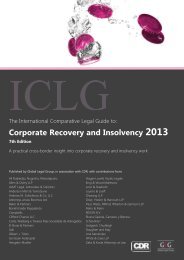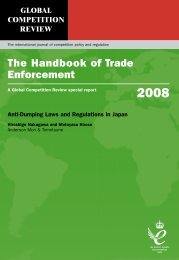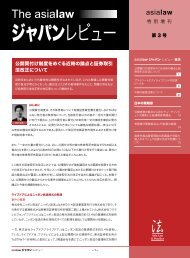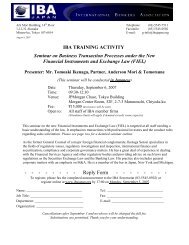PDF file
PDF file
PDF file
Create successful ePaper yourself
Turn your PDF publications into a flip-book with our unique Google optimized e-Paper software.
The International Comparative Legal Guide to:International Arbitration 20129th EditionA practical cross-border insight into international arbitration workPublished by Global Legal Group, in association with CDR, with contributions from:Abreu AdvogadosAdvokaturbüro Dr Dr Batliner & Dr GasserAivar Pilv Law OfficeAkerman SenterfittAli Budiardjo, Nugroho, ReksodiputroAnderson Mori & TomotsuneBarrera, Siqueiros y Torres Landa, S.C.Borden Ladner Gervais LLPBoss & YoungClayton UtzClifford Chance CIS LimitedCMS Cameron McKenna SCADe Brauw Blackstone WestbroekDr. Colin Ong Legal ServicesDr. K. Chrysostomides & Co LLCFerreira Rocha & AssociadosG Grönberg Advokatbyrå ABGeni & KebeGeorgiev, Todorov & Co.GESSEL Attorneys at lawGleiss LutzHabib Al Mulla & Co.Hajji & Associés – AvocatsHomburgerJiménez Cruz PeñaK&L Gates LLPKachwaha & PartnersKing & Spalding International LLPLazareff Le BarsLee and Li, Attorneys-at-LawLenczner SlaghtLendvai & SzörényiLinklaters LLPMaples and CalderMatheson Ormsby PrenticeMiranda Correia Amendoeira & Associados RLMotieka & AudzevičiusNunziante Magrone Studio Legale AssociatoOrrick, Herrington & Sutcliffe LLPPUNUKA Attorneys & SolicitorsQuisumbing Torres, member firm of Baker & McKenzie InternationalSedgwick ChudleighSergio Bermudes AdvogadosSherby & Co., Advs.Sidley Austin LLPSołtysiński Kawecki & SzlęzakTilleke & GibbinsTonucci & PartnersVasil Kisil & PartnersWald e Associados AdvogadosWEBER & CO.WerksmansWilmer Cutler Pickering Hale and Dorr LLP
The International Comparative Legal Guide to: International Arbitration 2012Preface:Preface by Gary Born, Head of International Arbitration Group, Wilmer Cutler Pickering Hale and Dorr LLPGeneral Chapters:Contributing EditorsSteven Finizio, WendyMiles and Kate Davies,Wilmer Cutler PickeringHale and Dorr LLPAccount ManagersDror Levy, Maria Lopez,Florjan Osmani, SamuelRomp, Oliver Smith, RorySmith, Toni WyattSub EditorFiona CanningEditorSuzie KiddSenior EditorPenny SmaleManaging EditorAlan FalachGroup PublisherRichard FirthPublished byGlobal Legal Group Ltd.59 Tanner StreetLondon SE1 3PL, UKTel: +44 20 7367 0720Fax: +44 20 7407 5255Email: info@glgroup.co.ukURL: www.glgroup.co.ukGLG Cover DesignF&F Studio DesignGLG Cover Image SourceiStockphotoPrinted byInformation Press LtdAugust 2012Copyright © 2012Global Legal Group Ltd.All rights reservedNo photocopyingISBN 978-1-908070-32-6ISSN 1741-4970Stategic Partners1 A Comparative Review of Emergency Arbitrator Provisions: Opportunities and Risks – Marc S. Palay &Tanya Landon, Sidley Austin LLP 12 I Know I am Going to Win, but What About my Money? Ensuring that Arbitration is Worththe Effort – Tom Sprange & Tom Childs, King & Spalding International LLP 83 Mandatory Arbitration and Consumer Class Actions in Canada and the United States –Lawrence Thacker, Lenczner Slaght 154 When is an Arbitration International and What Are the Implications? A Traditional Perspective onthe Enforcement of Annulled Awards – Gustavo Fernandes de Andrade & André Chateaubriand Martins,Sergio Bermudes Advogados 21Asia Pacific:5 Overview Dr. Colin Ong Legal Services: Dr. Colin Ong 276 Australia Clayton Utz: Doug Jones AO 377 Brunei Dr. Colin Ong Legal Services: Dr. Colin Ong 478 China Boss & Young: Dr. Xu Guojian 569 Hong Kong Clayton Utz in association with Hayley & Co: Glenn Haley & Patrick Daley 6710 India Kachwaha & Partners: Sumeet Kachwaha & Dharmendra Rautray 7911 Indonesia Ali Budiardjo, Nugroho, Reksodiputro: Sahat A.M. Siahaan &Windri Marieta Ayuningtyas 8812 Japan Anderson Mori & Tomotsune: Aoi Inoue 9813 Philippines Quisumbing Torres, member firm of Baker & McKenzie International:Donemark J.L. Calimon & Camille Khristine I. Aromas 10614 Singapore K&L Gates LLP: Ian Fisher & Andrea Utasy 11415 Taiwan Lee and Li, Attorneys-at-Law: Angela Y. Lin & Jeffrey Li 12216 Vietnam Tilleke & Gibbins: Michael K. Lee & Doan Ngoc Tran 130Central and Eastern Europe:17 Overview GESSEL Attorneys at law: Dr Beata Gessel-Kalinowska vel Kalisz, FCIArb 13818 Albania Tonucci & Partners: Neritan Kallfa & Majlinda Sulstarova 14219 Bulgaria Georgiev, Todorov & Co.: Alexander Katzarsky & Georgi Georgiev 15020 Cyprus Dr. K. Chrysostomides & Co LLC: George Mountis & Victoria-Zoi Papagiannis 16021 Estonia Aivar Pilv Law Office: Pirkka-Marja Põldvere & Ilmar-Erik Aavakivi 16922 Hungary Lendvai & Szörényi: András Lendvai & Gábor Baranyai LL.M 17723 Lithuania Motieka & Audzevičius: Ramūnas Audzevičius & Rimantas Daujotas 18424 Poland Sołtysiński Kawecki & Szlęzak: Dr. Marcin Olechowski & Sławomir Uss 19225 Romania CMS Cameron McKenna SCA: Horia Draghici & Bogdan Vetrici-Soimu 20026 Russia Clifford Chance CIS Limited: Timur Aitkulov & Julia Popelysheva 21027 Ukraine Vasil Kisil & Partners: Oleksiy Filatov & Pavlo Byelousov 221Western Europe:28 Overview Gleiss Lutz: Stefan Rützel & Stephan Wilske 23029 Austria WEBER & CO.: Stefan Weber & Ewald Oberhammer 23430 Belgium Linklaters LLP: Joost Verlinden & Stijn Sabbe 242Continued OverleafFurther copies of this book and others in the series can be ordered from the publisher. Please call +44 20 7367 0720DisclaimerThis publication is for general information purposes only. It does not purport to provide comprehensive full legal or other advice. Global Legal Group Ltd. and thecontributors accept no responsibility for losses that may arise from reliance upon information contained in this publication. This publication is intended to give anindication of legal issues upon which you may need advice. Full legal advice should be taken from a qualified professional when dealing with specific situations.www.ICLG.co.uk
The International Comparative Legal Guide to: International Arbitration 201231 England & Wales Wilmer Cutler Pickering Hale and Dorr LLP: Wendy Miles & Kate Davies 25232 France Lazareff Le Bars: Benoit Le Bars & William Kirtley 26933 Ireland Matheson Ormsby Prentice: Nicola Dunleavy & Gearóid Carey 27834 Italy Nunziante Magrone Studio Legale Associato: Prof. Dr. Gabriele Crespi Reghizzi 28735 Liechtenstein Advokaturbüro Dr Dr Batliner & Dr Gasser: Dr. Johannes Gasser &Benedikt König 29636 Netherlands De Brauw Blackstone Westbroek: Eelco Meerdink & Edward van Geuns 30437 Portugal Abreu Advogados: José Maria Corrêa de Sampaio & Pedro Sousa Uva 31338 Sweden G Grönberg Advokatbyrå AB: Einar Wanhainen & Johannes Lundblad 32539 Switzerland Homburger: Felix Dasser & Balz Gross 332Latin America:40 Overview Akerman Senterfitt: Luis M. O'Naghten 34141 Brazil Wald e Associados Advogados: Arnoldo Wald & Rodrigo Garcia da Fonseca 34942 Dominican Republic Jiménez Cruz Peña: Marcos Peña Rodríguez & Laura Medina Acosta 35643 Mexico Barrera, Siqueiros y Torres Landa, S.C.: Omar Guerrero Rodríguez &Mariana Fernández Salazar 365Middle East / Africa:44 Overview Habib Al Mulla & Co.: Gordon Blanke & Soraya Corm-Bakhos 37445 OHADA Geni & Kebe: Mouhamed Kebe & Fakha Toure 38046 Angola Miranda Correia Amendoeira & Associados RL: Agostinho Pereira de Miranda &Cláudia Leonardo 38747 Israel Sherby & Co., Advs.: Eric S. Sherby & Sami Sabzerou 39548 Morocco Hajji & Associés – Avocats: Amin Hajji 40549 Mozambique Ferreira Rocha & Associados in association with Abreu Advogados:Paula Duarte F. Rocha 41150 Nigeria PUNUKA Attorneys & Solicitors: Anthony Idigbe & Omone Tiku 41951 South Africa Werksmans: Des Williams 43452 UAE Habib Al Mulla & Co.: Gordon Blanke & Soraya Corm-Bakhos 445North America:53 Overview Orrick, Herrington & Sutcliffe LLP: Ian Johnson & Matt Prewitt 45554 Bermuda Sedgwick Chudleigh: Mark Chudleigh & Chen Foley 46155 BVI Maples and Calder: Arabella di Iorio & Victoria Lord 47056 Canada Borden Ladner Gervais LLP: Daniel Urbas & Robert J.C. Deane 48057 Cayman Islands Maples and Calder: Mac Imrie & Luke Stockdale 48958 USA K&L Gates LLP: Peter J. Kalis & Roberta D. Anderson 500
Chapter 12JapanAnderson Mori & TomotsuneAoi Inoue1 Arbitration Agreements1.1 What, if any, are the legal requirements of an arbitrationagreement under the laws of Japan?agreements in Japan. It was enacted in 2003 and became effectiveon March 1, 2004. The English translation of the Arbitration Act isavailable at the following website (please note that this Englishtranslation may have not reflected the amendments made after2003): www.kantei.go.jp/foreign/policy/sihou/arbitrationlaw.pdf.98An arbitration agreement must be in writing (Art. 13.2 of theJapanese Arbitration Act, Act No. 138 of 2003, as amended, the“Arbitration Act”). (Unless otherwise indicated, article and chapternumbers referred to in the chapter are those of the Arbitration Act.)An arbitration agreement is in writing when the agreement isreduced to: (i) the documents signed by the parties; (ii) thecorrespondence exchanged by the parties, including those sent byfacsimile transmissions and other communication devices whichprovide written records of the communicated contents to therecipient; and (iii) other written instructions. Additionally,electromagnetic records (i.e. email transmissions) are deemed to bein writing (Art. 13.4).1.2 What other elements ought to be incorporated in anarbitration agreement?The Arbitration Act does not stipulate specific elements to beincorporated in an arbitration agreement. In practice, the elementsusually incorporated are: (i) the parties; and (ii) the scope of thesubmission to arbitration. In addition, the following elementsshould be included: (i) applicable arbitration rules; (ii) applicablerules of evidence; (iii) place of arbitration; (iv) number ofarbitrators; (v) language to be used in the procedure; (vi) requiredqualification and skills of the arbitrator(s); (vii) waiver of sovereignimmunity; and (viii) confidentiality agreement.1.3 What has been the approach of the national courts to theenforcement of arbitration agreements?Japanese courts are friendly to arbitration agreements in general.Unlike the UNCITRAL Model Law, Japanese courts do not directlyrefer the case to arbitration, but dismiss the lawsuit in favour of anarbitration agreement. To this end, the defendant should <strong>file</strong> amotion to dismiss prior to the first court hearing (Art. 14.1).2 Governing Legislation2.1 What legislation governs the enforcement of arbitrationproceedings in Japan?The Arbitration Act governs the enforcement of arbitration2.2 Does the same arbitration law govern both domestic andinternational arbitration proceedings? If not, how do theydiffer?Yes. The Arbitration Act applies equally to both domestic andinternational arbitration.2.3 Is the law governing international arbitration based on theUNCITRAL Model Law? Are there significant differencesbetween the two?Yes, the Arbitration Act is basically in line with the UNCITRALModel Law, but there are a couple of differences on the followingpoints:Enforcement of Arbitration Agreement (Art. 14.1). Thenational court will dismiss a case brought before it if it findsthat the parties’ arbitration agreement is valid. The court willnot order the case to be submitted to arbitration. Please seequestion 1.3 above.Promotion of Settlement (Art. 38.4). The Arbitration Actstipulates that the tribunal may attempt to settle the dispute.Generally speaking, Japanese practitioners, includingarbitrators, prefer to settle the dispute rather than to make anarbitration award. This provision requires the parties’consent for the tribunal’s attempt to settle, to avoid thesituation that arbitrators place unnecessary pressure upon theparties for settling the case. Parties may withdraw theirconsent at any time until the settlement is reached.Arbitrator’s Fee (Art. 47). Unless otherwise agreed to by theparties, arbitrators can determine their own fees, while theUNCITRAL Model Law does not have such provisions.Since the fee schedules of arbitration institutions are usuallyapplied to institutional arbitrations, in practice, this provisiononly applies to ad-hoc arbitration.Deposit for Arbitration Costs (Art. 48). Unless otherwiseagreed to by the parties, arbitrators may order that the partiesdeposit an amount determined by the arbitral tribunal as thepreliminary arbitration costs.Consumer Dispute Exception (Supplementary Provision Art.3). The Arbitration Act confers consumers a unilateral rightto terminate the arbitration agreement entered between theconsumer and a business entity. Arbitration proceedings maybe proceeded if: i) the consumer is the claimant of theWWW.ICLG.CO.UKICLG TO: INTERNATIONAL ARBITRATION 2012© Published and reproduced with kind permission by Global Legal Group Ltd, London
Anderson Mori & TomotsuneJapanarbitration; or ii) the consumer explicitly waives the right todischarge after the arbitral tribunal explains about thearbitration procedure to the consumer at an oral hearing.Employment Dispute Exception (Supplementary ProvisionArt. 4). An arbitration agreement between an employer andan employee with respect to future disputes overemployment is invalid.2.4 To what extent are there mandatory rules governinginternational arbitration proceedings sited in Japan?Under the Arbitration Act, there are no mandatory rules specificallygoverning international arbitration proceedings sited in Japan.3 Jurisdiction3.1 Are there any subject matters that may not be referred toarbitration under the governing law of Japan? What is thegeneral approach used in determining whether or not adispute is “arbitrable”?“Arbitrability” is broadly defined in Japan to cover a variety of civiland commercial disputes. Unless otherwise provided by law, civiland commercial disputes that may be resolved by settlementbetween the parties (excluding that of divorce or separation) are“arbitrable” (Art. 13.1). However, a matter is not “arbitrable” if thefinal decision of the dispute may be binding on third parties.Although there are few laws which explicitly deny “arbitrability”,the following subject matters are generally considered to be NOT“arbitrable”: (i) validity of intellectual property rights granted bythe government, e.g. patents, utility models and trademarks; (ii)shareholders’ action seeking revocation of a resolution of theshareholders meeting; (iii) administrative decisions of governmentagencies; and (iv) insolvency and civil enforcement proceduraldecisions.3.2 Is an arbitrator permitted to rule on the question of his orher own jurisdiction?Yes. The Arbitration Act has adopted the Kompetenz-Kompetenzrule, and Art. 23.1 provides that: “[t]he arbitral tribunal may rule onassertion made in respect of the existence or validity of anarbitration agreement or its own jurisdictions (which means itsauthority to conduct arbitral proceedings and to make arbitralawards)”.3.3 What is the approach of the national courts in Japantowards a party who commences court proceedings inapparent breach of an arbitration agreement?The court will dismiss the lawsuit if the defendant <strong>file</strong>s a timelymotion to dismiss. If the defendant fails to <strong>file</strong> a timely motion todismiss, the court will proceed to hear the merits of the case. Seealso question 1.3.either party, within 30 days of the receipt of the ruling, may requestthe relevant court to review such ruling (Art. 23.5).In addition, courts may address the issue of jurisdiction of thearbitral tribunal at the stage of enforcement and/or enforceability ofan arbitration award.The court will conduct the de novo review of the tribunal’s decisionin respect of its jurisdiction. In other words, the court will not bebound by tribunal’s decision itself, and will review the tribunal’sjurisdiction case independently from the tribunal’s own decision.3.5 Under what, if any, circumstances does the national lawof Japan allow an arbitral tribunal to assume jurisdictionover individuals or entities which are not themselves partyto an agreement to arbitrate?As a principle, an arbitration agreement is binding only upon theparties to the arbitration agreement. In the case of a joint-venture,the participants to the joint-venture may be bound to the arbitrationagreement to which the joint-venture is a party. Furthermore, thecourt extended the scope of an arbitration agreement with respect tothe parties to the arbitration proceedings as a result of applying NewYork law (which was chosen by the parties as governing law) to theinterpretation of the arbitration agreement. K.K. Nihon Kyoiku Shav. Kenneth J. Feld, 68 Hanrei Jiho 1499 (Tokyo H. Ct., May 30,1994); appeal to the Supreme Court denied, 51 Minshu 3709 (Sup.Ct., Sep. 4, 1997).3.6 What laws or rules prescribe limitation periods for thecommencement of arbitrations in Japan and what is thetypical length of such periods? Do the national courts ofJapan consider such rules procedural or substantive, i.e.,what choice of law rules govern the application oflimitation periods?There is no provision related to limitation periods for thecommencement of arbitrations. Under the Japanese law, the rulesof limitation periods are substantive rather than procedural.Accordingly, parties may choose the law of limitation pursuant tothe conflict of laws in Japan (namely, the Act on General Rules ofApplication of Laws (Act No. 78 of 2007)).3.7 What is the effect in Japan of pending insolvencyproceedings affecting one or more of the parties toongoing arbitration proceedings?Neither the Arbitration Act, nor the Bankruptcy Act, provide anyspecific provisions as to how ongoing arbitration proceedings willbe affected by insolvency proceedings with respect to the parties tothe arbitration. In addition, there is no particular case law on thispoint. Thus, it is difficult to define the effect in Japan of pendinginsolvency proceedings upon arbitration proceedings, while anacademic authority argues that the arbitration proceedings shall besuspended upon the commencement of insolvency proceedings onthe parties and shall be resumed once a bankruptcy trustee isappointed.Japan3.4 Under what circumstances can a court address the issueof the jurisdiction and competence of the national arbitraltribunal? What is the standard of review in respect of atribunal’s decision as to its own jurisdiction?Based on the Kompetenz-Kompetenz rule (Art. 23.1; see alsoquestion 3.2 above), the arbitral tribunal will primarily review itsown jurisdiction. If the arbitral tribunal affirms its jurisdiction,4 Choice of Law RulesICLG TO: INTERNATIONAL ARBITRATION 2012© Published and reproduced with kind permission by Global Legal Group Ltd, London4.1 How is the law applicable to the substance of a disputedetermined?Primarily, the arbitral tribunal shall apply the law agreed by theparties as applicable to the substance of the dispute. If the partiesWWW.ICLG.CO.UK99
Anderson Mori & TomotsuneJapanJapanfail to agree on the applicable law, the tribunal shall apply such lawof the State with which the dispute is most closely connected (Arts.36.1 and 36.2). Notwithstanding these provisions, the tribunal shalldecide ex aequo et bono when the parties have expressly authorisedit to do so (Art. 36.3). In addition, in the case of a contract dispute,the tribunal shall decide in accordance with the terms of the contractand shall take into account the applicable usages, if any (Art. 36.4).4.2 In what circumstances will mandatory laws (of the seat orof another jurisdiction) prevail over the law chosen by theparties?Generally speaking, in those cases where regulatory issues (e.g.issues relating to labour law, antimonopoly law and patent law) areinvolved, mandatory laws may prevail over the laws chosen by theparties to the arbitration.4.3 What choice of law rules govern the formation, validity,and legality of arbitration agreements?According to Art. 44.1[2] of the Arbitration Act, validity of anarbitration agreement should be subject to the law agreed by bothparties as an applicable law, or in case of failing, to the laws of Japan.5 Selection of Arbitral Tribunal5.1 Are there any limits to the parties’ autonomy to selectarbitrators?There are no specified limits to the selection of arbitrators, i.e.parties may agree on the number, required qualification and skillsof arbitrators, and the methods of the selection.5.2 If the parties’ chosen method for selecting arbitrators fails,is there a default procedure?Yes. The Arbitration Act provides a default procedure for selectingarbitrators, which is basically the same as that of the UNCITRALModel Law.5.3 Can a court intervene in the selection of arbitrators? If so,how?Yes. Courts can select arbitrators upon request of either party ifthere is no agreement between the parties with respect to theselection of arbitrators, or the parties and/or party-appointedarbitrators fail to select arbitrators. In selecting arbitrators, thecourt shall take into account the following factors: (i) thequalifications required of the arbitrators by the agreement of theparties; (ii) the impartiality and independence of the appointees; and(iii) whether or not it would be appropriate to appoint an arbitratorof a nationality other than those of the parties (Art. 17.6).In a maritime dispute case between a Japanese company and anIndian distributor, the court selected an attorney listed in thecandidate list of the Tokyo Maritime Arbitration Commission of theJapan Shipping Exchange (“TOMAC”) as the sole arbitrator.Although the court seemed to have considered the nationalities ofthe parties, it chose a Japanese arbitrator on the basis that all listedcandidates of TOMAC were Japanese nationals and that the foreignparty did not mention its preference on nationality of the arbitratorduring the proceeding. Case No. Heisei 15 (wa) 21462, 1927Hanrei Jihou 75 (Tokyo D. Ct., Feb. 9, 2005).5.4 What are the requirements (if any) as to arbitratorindependence, neutrality and/or impartiality and fordisclosure of potential conflicts of interest for arbitratorsimposed by law or issued by arbitration institutions withinJapan?Reasonable doubt as to the impartiality and independence of thearbitrators can be the grounds for challenging them (Art. 18.1[2]).In order to secure the effectiveness of such a ‘challenge’ system,both arbitrator candidates and arbitrators are obliged to disclose allthe facts which may raise doubts as to their impartiality or theirindependence (Arts. 18.3 and 18.4).The “IBA Guidelines on Conflicts of Interest in InternationalArbitration” are widely recognised among international arbitrationpractitioners in Japan. Further, the Japan Association of Arbitrators(“JAA”) published a “Code of Ethics for arbitrators” in 2008. TheJAA’s Code of Ethics provides a standard for compliance withregard to neutrality and impartiality of arbitrators.6 Procedural Rules6.1 Are there laws or rules governing the procedure ofarbitration in Japan? If so, do those laws or rules apply toall arbitral proceedings sited in Japan?Yes, but in principle, the Arbitration Act allows parties to havebroad autonomy and the arbitral tribunal to have broad discretion(Art. 26). The mandatory rules are concerning “equal treatment ofparties”, “due process” and “public order” (Art. 25 and 26.1). Inaddition, the Arbitration Act provides “default rules” with respect tothe procedure, including: waiver of right to object (Art. 27); placeof arbitration (Art. 28); commencement of arbitral proceedings andinterruption of limitation (Art. 29); language (Art. 30); timerestriction on parties’ statements (Art 31); procedure of hearings(Art. 32); default of a party (Art. 33); expert appointed by arbitraltribunal (Art. 34); and court assistance in taking evidence (Art. 35).6.2 In arbitration proceedings conducted in Japan, are thereany particular procedural steps that are required by law?Yes. In arbitration proceedings, certain procedural steps arerequired under the Arbitration Act, which include: equal treatmentand due process (Art. 25); tribunal’s authority (Kompetenz-Kompetenz) (Art. 23.1); time limitation for arguing tribunal’sjurisdiction (Art. 23.2); prior notice of oral hearings (Art. 32.3);accessibility to other party’s brief and all evidence (Art. 32.4); formof awards (Art. 39); and completion of arbitral proceedings (Art.40). The Arbitration Act further provides the rules for thearbitration proceedings which involve a court’s intervention and/orassistance (Art. 35).6.3 Are there any rules that govern the conduct of anarbitration hearing?Yes, but they are minimal. Arbitral tribunal should have an oralhearing upon request by either party, unless otherwise agreed by theparties (Arts. 32.1 and 32.2). When an oral hearing is held for oralargument or inspection of goods, other properties or documents, thetribunal shall notify the parties of the time and place for suchhearing in advance (Art. 32.3).100WWW.ICLG.CO.UKICLG TO: INTERNATIONAL ARBITRATION 2012© Published and reproduced with kind permission by Global Legal Group Ltd, London
Anderson Mori & TomotsuneJapan6.4 What powers and duties does the national law of Japanimpose upon arbitrators?The Arbitration Act provides the arbitral tribunal with a wide rangeof powers with respect to arbitral proceedings. For example, theparty who intends to request the court to assist with the examinationof evidence, e.g. witnesses, expert witnesses and written evidence,shall obtain the tribunal’s prior consent (Art. 35.2). The ArbitrationAct also gives the arbitral tribunal powers to determine on itsjurisdiction (Kompetenz-Kompetenz) (Art. 23.1) and to renderinterim measures (Art. 24).6.5 Are there rules restricting the appearance of lawyers fromother jurisdictions in legal matters in Japan and, if so, is itclear that such restrictions do not apply to arbitrationproceedings sited in Japan?The Attorney Act (Act No. 205 of 1949) strictly prohibits nonlawyers(including lawyers admitted in foreign jurisdictions) fromperforming legal business in Japan (The Attorney Act, Art. 72). Aforeign lawyer registered in Japan may handle some legal businessin Japan, but only to the extent that the Act on Special Measuresconcerning the Handling of Legal Services by Foreign Lawyers(Act No. 66 of 1986, the “Foreign Lawyers Act”) allows them. Onthe other hand, the Foreign Lawyers Act explicitly sets out anexception to those restrictions, saying that lawyers admitted inforeign jurisdictions (whether registered in Japan or not) mayrepresent in the international arbitration proceedings, including thesettlement procedures (Arts. 5-3 and 58-2 of the Foreign LawyersAct).6.6 To what extent are there laws or rules in Japan providingfor arbitrator immunity?There are no statutory laws or rules providing for arbitratorimmunity in Japan.6.7 Do the national courts have jurisdiction to deal withprocedural issues arising during an arbitration?No. Courts may intervene or support arbitration proceedings onlywhen requested by the parties to the arbitration. Once the arbitraltribunal is composed, procedural issues arising during thearbitration procedure should be handled by the tribunal (Art. 23.1).7 Preliminary Relief and Interim Measures7.1 Is an arbitrator in Japan permitted to award preliminary orinterim relief? If so, what types of relief? Must anarbitrator seek the assistance of a court to do so?Yes (Art. 24). The arbitral tribunal can award preliminary andinterim relief when it considers it necessary. Usually, preliminaryrelief is used to maintain the status quo. The tribunal can exercisesuch powers without any assistance of the court. However, thepreliminary relief rendered by the arbitration tribunal shall not berecognised or enforced by courts.7.2 Is a court entitled to grant preliminary or interim relief inproceedings subject to arbitration? In whatcircumstances? Can a party’s request to a court for reliefhave any effect on the jurisdiction of the arbitrationtribunal?Yes (Art. 15). Upon request of a party to the dispute, courts cangrant preliminary relief at any time before or during the arbitralproceedings, in respect of any civil dispute subject to arbitration.7.3 In practice, what is the approach of the national courts torequests for interim relief by parties to arbitrationagreements?The courts will assess whether the requirements for the granting ofpreliminary or interim relief as stipulated in the Civil ProvisionalRemedies Act (Act No. 91 of 1989, “CPRA”) have been satisfied.In order for the courts to grant preliminary or interim relief, (i) theright or relationship of rights to be preserved, and (ii) the necessityfor preliminary or interim relief must be evidenced by making aprima facie showing. Further, the courts may order either party toprovide appropriate security for the preliminary or interim relief. Inpractice, the arbitral tribunal’s ability to order its own effectiveinterim measures may influence the court’s decision as regards thenecessity requirement of (ii) above.7.4 Under what circumstances will a national court of Japanissue an anti-suit injunction in aid of an arbitration?Japanese courts will not issue an anti-suit injunction in aid ofarbitration under any circumstances.7.5 Does the national law allow for the national court and/orarbitral tribunal to order security for costs?Yes. Both courts and arbitral tribunals may order either party toprovide appropriate security for the interim measures (Art. 24.2 andrelevant provisions of the CPRA).8 Evidentiary Matters8.1 What rules of evidence (if any) apply to arbitralproceedings in Japan?The Arbitration Act does not provide any specific rules of evidence.Instead, it gives arbitral tribunals authority to determineadmissibility of evidence, necessity for taking evidence andprobative value of evidence (Art. 26.3). Generally speaking, mostpractitioners in Japan, including both attorneys and arbitrators,usually follow Japanese evidence rules, which do not include fullyfledgeddiscovery. In the meantime, the “IBA Rules on the Takingof Evidence in International Arbitration” are being widelyacknowledged by Japanese practitioners of internationalcommercial arbitration.8.2 Are there limits on the scope of an arbitrator’s authority toorder the disclosure of documents and other disclosure(including third party disclosure)?JapanICLG TO: INTERNATIONAL ARBITRATION 2012© Published and reproduced with kind permission by Global Legal Group Ltd, LondonThere is no limitation on the scope of an arbitrator’s authority withrespect to the disclosure of documents. However, fully-fledgeddocumentary disclosure is not common in arbitration practice inJapan. See also question 8.1.WWW.ICLG.CO.UK101
Anderson Mori & TomotsuneJapanJapan8.3 Under what circumstances, if any, is a court able tointervene in matters of disclosure/discovery?Unless otherwise agreed by the parties, courts can intervene in orassist with taking evidence upon request of the tribunal or of a party(Art. 35.1). The requesting party shall obtain the tribunal’s consentprior to the request. The court’s intervention, includingexamination of witnesses and obtaining expert opinions, is subjectto the Code of Civil Procedure (Law No. 109 of 1996, as amended,“CCP”).8.4 What, if any, laws, regulations or professional rules applyto the production of written and/or oral witness testimony?For example, must witnesses be sworn in before thetribunal or is cross-examination allowed?It is left up to the arbitral tribunal’s discretion to decide how ithandles evidence and testimony, unless otherwise agreed by theparties (Art. 26.3). As long as the tribunal finds it necessary andappropriate, written testimony may be admitted. If such testimonyis admitted, the tribunal usually allows the other party to crossexaminethe witness in the hearing.8.5 What is the scope of the privilege rules under the law ofJapan? For example, do all communications with outsidecounsel and/or in-house counsel attract privilege? In whatcircumstances is privilege deemed to have been waived?Under Japanese law, there is no clear categorical concept of“attorney-client privilege” with respect to production of documents.As long as the tribunal follows Japanese rules of evidence, attorneyclientprivilege rarely poses as an issue because fully-fledgeddiscovery is rarely conducted. However, if the arbitral proceedingsgive rise to such issue, arbitrators will usually respect attorneyclientprivilege.9 Making an Award9.1 What, if any, are the legal requirements of an arbitralaward? For example, is there any requirement under thelaw of Japan that the Award contain reasons or that thearbitrators sign every page?Arbitral awards must be in writing. The majority of arbitrators mustsign the award. If one or more arbitrator(s) cannot sign the award,reasons must be provided as to why they cannot. Reasons forconclusions, the date, and the place of arbitration must be includedin the award (Art. 39). Where the settlement of parties is reducedto the form of an arbitral award, the arbitral tribunal shouldexplicitly mention such background information (Art. 38). There isno requirement under the Arbitration Act that the arbitrators signevery page.was unable to defend itself in the proceedings; (iv) the arbitral awardcontains decisions on matters beyond the scope of the arbitrationagreement or the claims in the arbitral proceedings; (v) thecomposition of the arbitral tribunal or the arbitral proceedings werenot in accordance with the provisions of Japanese law (or where theparties have otherwise reached an agreement on matters concerningthe provisions of the law that is not in accordance with public policy);(vi) the claims in the arbitral proceedings relate to disputes thatcannot constitute the subject of an arbitration agreement underJapanese law; or (vii) the content of the arbitral award is in conflictwith the public policy or the good morals of Japan (Art. 44.1).Regarding (iii) above, a recent court decision articulated that“unable to defend” shall mean that there was a material proceduralviolation in the arbitration proceedings (i.e. the opportunity todefend was not given to the party throughout the proceedings).With respect to (vii) above, the same court also said that merelyclaiming that the factual findings or ruling of the arbitration tribunalwere unreasonable should not be regarded as a valid basis forsetting aside the award. In re American International Underwriters,Ltd., 1304 Hanrei Taimuzu 292 (Tokyo D. Ct., July 28, 2009).10.2 Can parties agree to exclude any basis of challengeagainst an arbitral award that would otherwise apply as amatter of law?There are no explicit provisions in the Arbitration Act which allowparties to agree to exclude any grounds for challenging an arbitralaward. It is generally considered that the parties may not waivetheir rights to set aside arbitral awards.10.3 Can parties agree to expand the scope of appeal of anarbitral award beyond the grounds available in relevantnational laws?Probably not. There are no explicit provisions in the Arbitration Actwhich restrict parties from expanding the grounds for appealing orchallenging the arbitral award. However, the court, in obiter,rejected the parties’ argument to set aside the award based on anadditional ground set out in the mutual agreement by the parties.Descente Ltd v. Adidas-Salomon AG et al., 123 Hanrei Jiho 1847(Tokyo D. Ct., Jan. 26, 2004).10.4 What is the procedure for appealing an arbitral award inJapan?No appeal is allowed against an arbitral award; however a party can<strong>file</strong> with a competent district court a motion to set aside the award.Such motion should be made within three months upon the receiptof the arbitration award or before the enforcement decision hasbecome final and conclusive (Art. 44.2).11 Enforcement of an Award10 Challenge of an Award10.1 On what bases, if any, are parties entitled to challenge anarbitral award made in Japan?11.1 Has Japan signed and/or ratified the New YorkConvention on the Recognition and Enforcement ofForeign Arbitral Awards? Has it entered anyreservations? What is the relevant national legislation?102Parties are entitled to request the court to “set aside” an arbitral awardon the following basis: (i) the arbitration agreement is not valid; (ii)the party making the application was not given notice as requiredunder Japanese law during the proceedings to appoint arbitrators orduring the arbitral proceedings; (iii) the party making the applicationYes. Japan acceded to the New York Convention on June 20, 1961.The New York Convention became effective in Japan fromSeptember 18, 1961, with a reservation of reciprocity. Since theNew York Convention has direct effect in Japan, there is nodomestic statute implementing the New York Convention. On theWWW.ICLG.CO.UKICLG TO: INTERNATIONAL ARBITRATION 2012© Published and reproduced with kind permission by Global Legal Group Ltd, London
Anderson Mori & TomotsuneJapanother hand, foreign awards of a non-signatory country/region to theNew York Convention, such as Taiwan, can be enforced accordingto the relevant provision of the Arbitration Act (Art. 46).11.2 Has Japan signed and/or ratified any regionalConventions concerning the recognition and enforcementof arbitral awards?No. Although several bilateral treaties refer to commercialarbitration, none of them provides simpler enforcement proceduresthan that of the New York Convention.12.2 Can information disclosed in arbitral proceedings bereferred to and/or relied on in subsequent proceedings?The Arbitration Act does not explicitly prohibit parties fromreferring to information disclosed in the course of arbitralproceedings. Accordingly, unless otherwise agreed by the parties,or provided for in the relevant institutional rules for arbitration,parties may refer to the information disclosed in the previousarbitration in subsequent court proceedings.13 Remedies / Interests / CostsJapan11.3 What is the approach of the national courts in Japantowards the recognition and enforcement of arbitrationawards in practice? What steps are parties required totake?As the New York Convention has a direct effect in Japan, partiescan simply follow the procedural requirements stated in the NewYork Convention. As required in the New York Convention, partiesneed to prepare a Japanese translation of the award if it is written ina foreign language.11.4 What is the effect of an arbitration award in terms of resjudicata in Japan? Does the fact that certain issues havebeen finally determined by an arbitral tribunal precludethose issues from being re-heard in a national court and,if so, in what circumstances?Arbitral awards, irrespective of whether or not the arbitration tookplace in the territory of Japan, shall have the same effect as a finaland conclusive judgment (Art. 45.1). This provision is generallyunderstood that an arbitral award shall be pled as res judicata.11.5 What is the standard for refusing enforcement of anarbitral award on the grounds of public policy?As per Art. 45.2[9] of the Arbitration Act, Japanese courts willconsider if the enforcement of the award will be in conformity withthe laws of Japan and whether it is procedural law or substantivelaw. This standard is basically the same as the one used to set asidean arbitral award (Art. 44.1[8]).12 Confidentiality12.1 Are arbitral proceedings sited in Japan confidential? Inwhat circumstances, if any, are proceedings not protectedby confidentiality? What, if any, law governsconfidentiality?The Arbitration Act does not have a particular provision with respectto confidentiality. It is entirely up to the parties’ agreement or therelevant institutional rules for arbitration rules applied to theprocedure. At the same time, the rules of most arbitration bodies inJapan, such as Japan Commercial Arbitration Association (“JCAA”)and TOMAC, have provisions in respect of confidentiality. Asconfidentiality of arbitration proceedings rely on the rules of eacharbitration organisation, the confidentiality of arbitration proceedingshas the same protection as an ordinary confidentiality agreement.13.1 Are there limits on the types of remedies (includingdamages) that are available in arbitration (e.g., punitivedamages)?No. However, “punitive damages” that exceed compensatorydamages might not be enforced by Japanese courts, as courts mayfind that the concept of punitive damages is against the “publicpolicy” in Japan. Under the New York Convention (Art. 2(b)) andthe Arbitration Act (Arts. 45 and 46), courts may reject theenforcement of an award if is contrary to the “public order” ofJapan. A foreign judgment which contained punitive damages,claimed separately from compensatory damages, have been rejectedby the court on the grounds that the enforcement of which would becontrary to “public order”. Mansei Industrial K.K. v. Northcon [I],51 Minshu 2530 (Sup. Ct., Jul. 11, 1997).13.2 What, if any, interest is available, and how is the rate ofinterest determined?It is up to the relevant provisions of the applicable substantive law.Where Japanese law applies to the merits of the case, the arbitraltribunal will award such interest as stipulated in the contract, or inthe Japanese statute (which is 6% per annum in commercial mattersand 5% per annum in other civil matters).13.3 Are parties entitled to recover fees and/or costs and, if so,on what basis? What is the general practice with regardto shifting fees and costs between the parties?Arbitration Acts provides for the rules with respect to the costs ofthe arbitration proceedings. As a general rule, each party to thearbitration shall bear the costs it has disbursed in the arbitralproceedings, unless otherwise agreed by the parties (Art. 49.1). Ifit is so indicated by the agreement of the parties, the arbitral tribunalmay, in an arbitral award or in an independent ruling, determine theapportionment between the parties of the costs (Art. 49.2). Theruling on the cost by the tribunal shall have the same effect as anarbitral award (Art. 49.3).13.4 Is an award subject to tax? If so, in what circumstancesand on what basis?Payment made pursuant to an arbitral award may be subject torelevant taxes in Japan. The basis of such may differ depending onthe nature of the payment and the underlying dispute.ICLG TO: INTERNATIONAL ARBITRATION 2012© Published and reproduced with kind permission by Global Legal Group Ltd, LondonWWW.ICLG.CO.UK103
Anderson Mori & TomotsuneJapanJapan13.5 Are there any restrictions on third parties, includinglawyers, funding claims under the law of Japan? Arecontingency fees legal under the law of Japan? Are thereany “professional” funders active in the market, either forlitigation or arbitration?In general, funding by a third party is not specifically prohibited.However, attorneys are not allowed to lend money to their clientunless there are special circumstances, such as in the event of anemergency, which require the advance payment of litigation costs.“Professional” funders are not active in the market, neither forlitigation, nor arbitration.Contingency fee arrangements are not specifically prohibited.However, attorneys’ fees must always be appropriate andcontingency fee arrangements might be considered inappropriate ifthey result in the amount of the attorneys’ fees becoming extremelyhigh in comparison with the benefit obtained by their clients.14 Investor State Arbitrations14.4 What is the approach of the national courts in Japantowards the defence of state immunity regardingjurisdiction and execution?The Supreme Court of Japan ruled that, while sovereign activitiesshall be immune from liability, the liabilities arose from nonsovereignactivities, such as commercial transactions, of the foreigngovernment will not be exempt. Tokyo Sanyo Trading K.K. v.Islamic Republic of Pakistan, 60 Minshu 2542 (Sup. Ct., Jul. 21,2006). A new legislation with respect to the immunity of theforeign state, which came into effect as of April 1, 2010, basicallytraces the above Supreme Court ruling.15 General15.1 Are there noteworthy trends in or current issues affectingthe use of arbitration in Japan (such as pending orproposed legislation)? Are there any trends regarding thetype of disputes commonly being referred to arbitration?14.1 Has Japan signed and ratified the WashingtonConvention on the Settlement of Investment DisputesBetween States and Nationals of Other States (1965)(otherwise known as “ICSID”)?Yes. Japan signed it on September 23, 1965 and ratified it onAugust 17, 1967.14.2 How many Bilateral Investment Treaties (BITs) or othermulti-party investment treaties (such as the EnergyCharter Treaty) is Japan party to?Use of commercial arbitration has been stable in Japan in recentyears. Although the use of arbitration has not increaseddramatically, the increasing number of legal professionals as aresult of legal reforms may be affecting the development ofinternational commercial arbitration in Japan. As to internationalcommercial arbitration in Japan, disputes related to distributionagreements, licence agreements and joint venture agreements aretypically referred to arbitration under the JCAA rules. Further,maritime (domestic or international) and construction (mostlydomestic) are major areas in which arbitration procedures arefrequently used to resolve disputes.Japan had entered into 28 BITs (including Economic PartnershipAgreements with investment section) as of April 2012, some ofwhich explicitly allow parties to resort their disputes to ICSID.Also, Japan is a member country of the Energy Charter Treaty.14.3 Does Japan have any noteworthy language that it uses inits investment treaties (for example in relation to “mostfavoured nation” or exhaustion of local remediesprovisions)? If so, what is the intended significance ofthat language?Japan does not have standard terms or model language that it usesin its investment treaties. As to what types of protection areavailable and what conditions have to be satisfied under theinvestment treaty, the provisions of the relevant treaty must becarefully examined.15.2 What, if any, recent steps have institutions in Japan takento address current issues in arbitration (such as time andcosts)?JCAA Commercial Arbitration Rules as amended and effective onJanuary 1, 2008 are generally consistent with the accepted practicesof other major international arbitral institutions. Under the JCAArules, the arbitral tribunal is required to make efforts towards theexpedited resolution of the dispute (Rule 32.4) and to make aschedule of arbitral proceedings as soon as the arbitral tribunal isestablished (Rule 32.5). Further, TOMAC implemented revisedrules effective from April 1, 2010, aimed at enhancing theefficiency of proceedings.104WWW.ICLG.CO.UKICLG TO: INTERNATIONAL ARBITRATION 2012© Published and reproduced with kind permission by Global Legal Group Ltd, London
Anderson Mori & TomotsuneJapanAoi InoueAnderson Mori & TomotsuneIzumi Garden Tower6-1 Roppongi 1-chomeMinato-ku, Tokyo 106-6036JapanTel: +81 3 6888 5802Fax: +81 3 6888 6802Email: aoi.inoue@amt-law.comURL: www.amt-law.comJapanAdmitted: Japan 2004; and New York 2011.Education: The University of Tokyo (LL.B 2001), Legal Trainingand Research Institute of the Supreme Court of Japan (2004);and Columbia Law School (LL.M 2010).Social Activities: Deputy Secretary General, Japan Association ofArbitrators (2005-present).Professional Experience: Anderson Mori & Tomotsune (2004 topresent); Associated with Hughes Hubbard & Reed LLP, NewYork, September 2010-March 2011; and trained at theInternational Centre for Dispute Resolution (ICDR), theinternational division of the American Arbitration Association(AAA), April-June 2011.Aoi Inoue is working primarily in the fields of litigation,international commercial arbitration and other forms of alternativedispute resolution. He is native in Japanese and is fluent inEnglish.Anderson Mori & Tomotsune has a wide-ranging litigation, arbitration and dispute resolution practice that encompasses the manyfacets of business in Japan. We have extensive experience in areas that closely reflect the international nature of our client baseand the international experience and diversity of our people. Our firm is able to provide a complete dispute resolution service toour clients, ranging from preliminary advice aimed at early resolution and prevention of disputes to the conduct of complex trials.Our attorneys have experience working in overseas jurisdictions and include among their ranks, former judges including a formerSupreme Court Justice. In addition to engaging in the day-to-day conduct of dispute resolution, some of our attorneys are alsoactively involved in imparting their experience and expertise to the next generation of law students through university lecturing.We have had extensive experience arbitrating and representing clients in arbitrations <strong>file</strong>d with and administered under the rulesof the Japan Commercial Arbitration Association (JCAA); International Chamber of Commerce (ICC); American ArbitrationAssociation (AAA); London Court of International Arbitration (LCIA); and the Daini Tokyo Bar Association; as well as ad hocarbitrations and other dispute resolution methods.ICLG TO: INTERNATIONAL ARBITRATION 2012© Published and reproduced with kind permission by Global Legal Group Ltd, LondonWWW.ICLG.CO.UK105
Other titles in the ICLG series include:Aviation LawBusiness CrimeCartels & LeniencyClass & Group ActionsCommodities and Trade LawCompetition LitigationCorporate GovernanceCorporate Recovery & InsolvencyCorporate TaxDominanceEmployment & Labour LawEnforcement of Competition LawEnvironment & Climate Change LawGas RegulationInsurance & ReinsuranceLeveraged FinanceLitigation & Dispute ResolutionMerger ControlMergers & AcquisitionsPatentsPFI / PPP ProjectsPharmaceutical AdvertisingPrivate ClientProduct LiabilityProject FinancePublic ProcurementReal EstateSecuritisationTelecoms, Media & InternetTrade Marks59 Tanner Street, London SE1 3PL, United KingdomTel: +44 20 7367 0720 / Fax: +44 20 7407 5255Email: sales@glgroup.co.ukwww.iclg.co.uk


